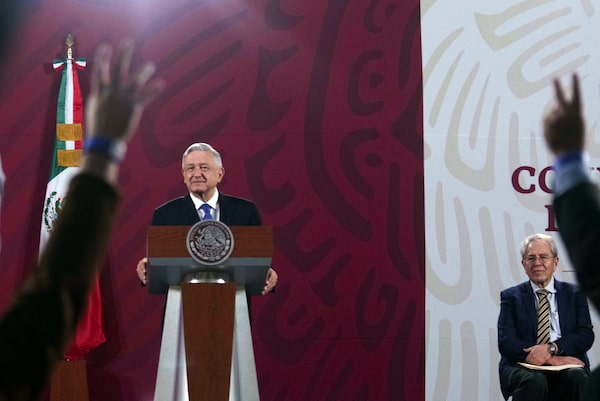
Handout photo shows Mexico's President Andres Manuel Lopez Obrador during his morning conference at the National Palace in Mexico City on July 7, 2020.-/AFP/Getty Images
During his successful campaign for the Mexican presidency, Andres Manuel Lopez Obrador described Donald Trump’s supporters as “neo-fascists” and compared their anti-immigrant ideology to that of Nazi Germany.
But since taking office 19 months ago, Mr. Lopez Obrador has adopted a deferential attitude toward the U.S. President. The Mexican leader has deployed troops to stop Central American asylum-seekers heading toward the U.S.; enforced Mr. Trump’s Remain in Mexico program by playing host to refugee claimants on the southern side of the border while their cases are processed in the U.S.; and repeatedly refused to criticize the under-construction border wall.
This policy of appeasement will reach its peak Wednesday when Mr. Lopez Obrador visits the White House in his first foreign trip as President, ostensibly to mark the start of the U.S.-Mexico-Canada Agreement that replaced NAFTA this month.
After the planned meeting triggered an avalanche of criticism in Mexico, Mr. Lopez Obrador tried to persuade Prime Minister Justin Trudeau to join the confab in Washington. Such a “Three Amigos” summit might have blunted the effect of Mexico’s President breaking bread with his country’s harshest detractor.
But Mr. Trudeau decided not to go, citing the Trump administration’s threats of renewed steel and aluminum tariffs, the unresolved COVID-19 pandemic and the need to be in Ottawa for Parliament’s return. One senior Canadian official said the visit had always been planned as a U.S.-Mexico meeting, and it was only relatively recently that Canada was invited to attend as well.
Trudeau says he’s too busy to join Trump and Lopez Obrador for USMCA celebration
Mr. Lopez Obrador, however, is forging ahead. He defended the move this week as vital for the continental economy.
“It ensures economic integration with respect to our sovereignty, which allows us to strengthen ourselves as a region,” the President, who is usually referred to in Mexico as AMLO, after his initials, told reporters.
Such assurances have done nothing to mollify Mexican critics. A parade of politicians, commentators and foreign-policy experts, including former cabinet ministers, has hammered Mr. Lopez Obrador for dropping in on Mr. Trump in the middle of a U.S. election campaign.
“There has never been a President of the United States who has been as vocal, as insulting and as unfavourable towards Mexico as Trump. To go and see him, and to spend any time with him, is an affront to us as Mexicans,” Andres Rozental, a Mexican former deputy foreign minister, said in an interview. “We have always defended our interests and stood up to the U.S. This government, this administration, has refused to do that.”
Mr. Trump has built his political brand on attacking Mexico. He has threatened hefty tariffs on the country’s auto industry, built sections of the border wall, and described Mexicans as “animals” and violent criminals.
Analysts suggest several reasons Mr. Lopez Obrador would want a meeting with Mr. Trump. One is that he hopes to court investment from U.S. companies moving supply chains out of China. Another is to assuage the concerns of business interests in Mexico that the country’s leader has not yet made a single foreign trip. A third is that Mr. Lopez Obrador could use a diversion from bad news at home.
Mexico is struggling to contain COVID-19, with the world’s fifth-highest death toll and some of the lowest testing rates of any large country. Mr. Lopez Obrador has appeared not to take the pandemic seriously, claiming that religious amulets would keep him from getting infected.
Despite coming from a different ideological background than Mr. Trump – Mr. Lopez Obrador is a parsimonious leftist who travelled to Washington on a commercial flight – the two leaders are both anti-establishment populists with similar political styles. The Mexican President accuses reporters of being in league with his political opponents, is trying to dismantle government watchdog agencies and runs a pro-oil energy policy.
“I think he likes Trump – they are both very much alike. They both like to attack the press, they’re not much into oversight and democracy, they’re against science on climate change and COVID,” said Jorge Guajardo, a former high-ranking Mexican diplomat.
And while Mr. Lopez Obrador has made most of the concessions in the relationship, things aren’t entirely one-sided. This spring, the U.S. backed Mexico’s decision to make smaller cuts to oil production than OPEC+ countries had demanded. Mr. Trump has also publicly praised Mr. Lopez Obrador as a “really great guy.”
Still, the potential downsides for Mr. Lopez Obrador are enormous. When his predecessor, Enrique Pena Nieto, hosted Mr. Trump in Mexico City in 2016, he immediately faced a political firestorm.
“I am just astounded by how risky the trip is given the political moment we’re in in the United States,” said Christopher Wilson, deputy director of the Mexico Institute at the Wilson Center think tank in Washington. “It ends up just looking like President Lopez Obrador is coming to meet with President Trump and to meet with U.S. investors who are concerned about the way their investments are being handed, rather than propose a more positive agenda.”
Know what is happening in the halls of power with the day’s top political headlines and commentary as selected by Globe editors (subscribers only). Sign up today.